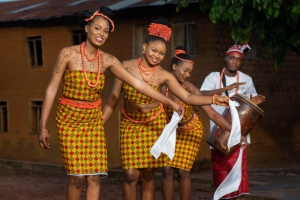Botswana is a country rich in culture, tradition, and warm hospitality. The people, predominantly from the Tswana ethnic group, value respect, politeness, and community. Understanding local customs and etiquette will not only make your trip smoother but will also help you connect with locals on a deeper level. Whether you’re exploring cities like Gaborone and Maun, visiting rural villages, or on a safari, here’s what you need to know about cultural norms, traditions, and social expectations in Botswana.
1. Greetings and Social Etiquette
In Botswana, greetings are very important and are considered a sign of respect. Skipping a greeting before starting a conversation can be seen as rude.
- A typical greeting involves a handshake with the right hand, sometimes combined with a slight nod or bow.
- The traditional Setswana greeting is:
- “Dumelang” (Hello – to more than one person)
- “Dumela” (Hello – to one person)
- “O kae?” (How are you?) – The polite response is “Ke teng, wena?” (I’m fine, and you?)
- When greeting an elder or someone in a position of authority, it’s respectful to slightly lower your head or use both hands when shaking hands.
- If someone extends a greeting in Setswana, respond in Setswana rather than English—it’s appreciated.
💡 Tip: Take your time with greetings. Rushing through them may be considered impolite.
2. Respect for Elders and Authority
Botswana has a deep respect for elders and authority figures, including village chiefs, teachers, and government officials.
- When speaking to an elder, use formal language and avoid interrupting.
- When passing by elders or groups of people, a simple “Dumela” (hello) is expected.
- In rural areas, it is polite to slightly bow when greeting older people.
- Never address an elder or official by their first name unless invited to do so. Use “Rra” (Sir) or “Mma” (Madam) followed by their last name.
💡 Tip: If visiting a rural village, introduce yourself to the kgosi (chief) or local elders before engaging with the community.
3. Dress Code: Modesty is Key
While Botswana is more relaxed than some other African nations, conservative dress is still valued, especially in rural areas and religious spaces.
- In cities, casual Western clothing is fine, but avoid overly revealing outfits.
- Women should dress modestly—short skirts, crop tops, and tight outfits may be frowned upon in villages.
- When visiting religious or traditional sites, it’s best to wear long skirts/pants and cover shoulders.
- Swimwear is fine at lodges and pools, but it’s inappropriate to walk around in beachwear outside of these areas.
💡 Tip: If unsure about what to wear, observe how locals dress and follow suit.
4. Dining Etiquette & Food Customs
Food in Botswana is often shared and eaten communally, particularly in rural settings. Here’s what to keep in mind:
- Wash your hands before and after eating—handwashing stations or bowls of water may be provided before meals.
- In traditional settings, people eat with their hands (particularly with pap, a maize porridge). If using your hands, use your right hand—the left is considered unclean.
- If invited to a home for a meal, it is polite to wait for the host to start eating before you begin.
- Accepting food or drink with both hands is a sign of gratitude.
- If offered food and you don’t want it, politely decline rather than refusing outright. A simple “Ke kopa tshwarelo, ke jele” (I’m sorry, I’ve already eaten) is a respectful way to decline.
💡 Tip: If you’re a guest, finishing your food is a sign of appreciation, but leaving a little bit on your plate shows that you were well-fed.
5. Taboos and Things to Avoid
Certain behaviors are considered disrespectful or inappropriate in Botswana:
- Pointing at people with your finger is considered rude—use your whole hand instead.
- Public displays of affection (PDA), such as kissing and hugging, are frowned upon, especially in rural areas. Holding hands is acceptable.
- Speaking loudly or aggressively in public is seen as rude—Botswana’s culture values humility and soft-spoken communication.
- Taking photos of people without asking permission is considered disrespectful, particularly in villages.
- Avoid discussing politics openly, especially topics related to government criticism.
- Do not assume everyone speaks English—while English is an official language, many people prefer Setswana in daily interactions.
💡 Tip: If you’re unsure whether something is appropriate, observe how locals behave or ask politely.
6. Gift-Giving Etiquette
Giving gifts is not expected in Botswana, but it’s a thoughtful gesture when visiting someone’s home.
- Small gifts like fruit, tea, or snacks are appreciated when visiting a family.
- Alcohol is not always an appropriate gift, as some people (especially elders) may disapprove of drinking.
- If receiving a gift, it is polite to accept it with both hands and express gratitude.
- Gifts are usually not opened immediately in front of the giver.
💡 Tip: In rural villages, bringing school supplies or books for children is a thoughtful and appreciated gift.
7. Religious and Traditional Beliefs
Botswana is a religiously diverse country, with most people identifying as Christian, but traditional beliefs and ancestor worship still play a significant role in rural communities.
- If invited to a church service or traditional ceremony, it is polite to attend, even if just for a short time.
- Avoid making negative comments about religion or traditional practices—they are deeply respected.
- Some communities practice ancestral rituals and healing ceremonies—if invited, be open-minded and respectful.
💡 Tip: If unsure about a religious or cultural practice, observe quietly and follow the lead of locals.
8. Language and Communication Style
English is widely spoken in Botswana, but Setswana is the most common language. Learning a few key phrases shows respect and effort.
- Dumela (Hello)
- Ke a leboga (Thank you)
- O kae? (How are you?)
- Ga ke tlhaloganye (I don’t understand)
- Tshwarelo (Excuse me / Sorry)
Botswana’s communication style is polite and indirect—people avoid confrontation, and being overly assertive may come across as rude.
💡 Tip: A smile and polite tone go a long way in creating positive interactions.
Final Thoughts: Embracing Botswana’s Culture
Botswana’s people are welcoming, friendly, and respectful, and as a traveler, showing the same respect will make your experience even richer. Taking the time to greet people properly, dress modestly, and observe local customs will help you blend in and be warmly received. By embracing Botswana’s customs and etiquette, you’re not just a visitor—you’re showing appreciation for the country’s rich traditions and way of life. Enjoy your trip, go siame! (Goodbye and travel well!)







